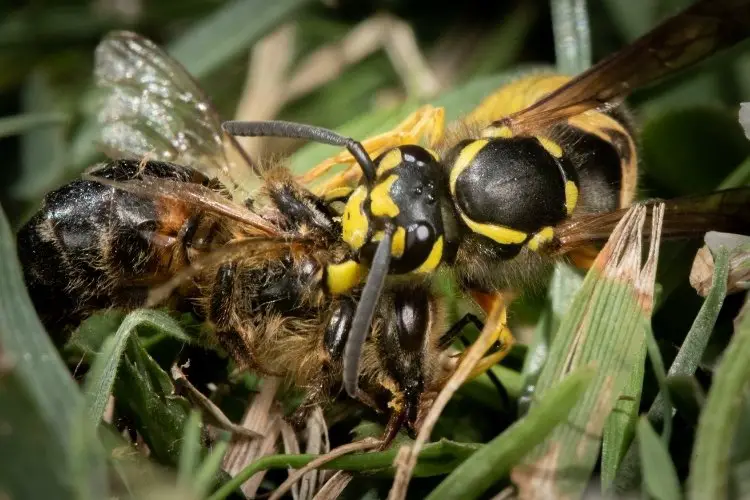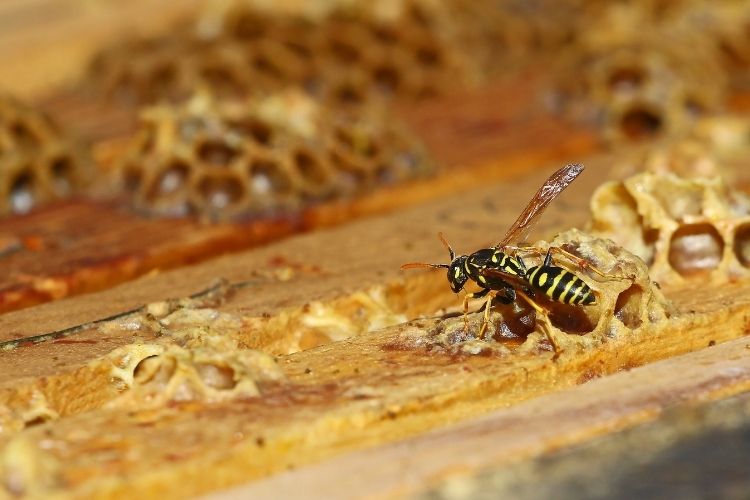Bees and wasps look similar, but they’re not the same. Wasps are larger and tend to be more aggressive. In fact, they sometimes prey on bees!
Many types of wasp (including yellowjackets) attack and kill honey bees as a source of food for their young. This most commonly occurs during summer, when other food sources are running low and the population of wasp colonies reaches the highest point.
Why Do Wasps Kill Bees?
Honey bees get their food from flowers, collecting nectar and pollen to feed their colony. Wasps, on the other hand, get their protein from scavenging or killing other insects. This commonly includes flies, ants, aphids, crickets, caterpillars, and, on occasion, bees.
In spring, wasps start to create new colonies, which continue to grow in size throughout the following months. This can lead to a lack of food by the end of summer, so wasps turn their attention to honey bees.
Because adult wasps don’t live very long, they don’t actually eat protein. Instead, the insects they catch are chewed up and fed to their young.
Wasps kill bees by pinning them down, then using their jaws to cut them into pieces. Wasps often slice their prey up because it makes it easier to transport back to the hive.

Wasps Also Take Honey From Beehives
While young wasps need protein to grow, adult wasps only eat carbohydrates. They get their carbs from various sources of food, including plant nectar, fruit, and honeydew.
When the supply of these foods is insufficient to feed their colony, wasps will turn their attention to other sources of carbohydrates, such as honey.
Wasps will invade beehives and steal honey. They may even take larvae, pupae, and eggs, too.
Weak hives are more susceptible to wasp attacks and become easy targets. Wasps will attack a beehive in groups and keep coming back to kill adult bees and brood and steal all the food.
Consistent robbing from wasps can be a huge danger and lead to the death of the colony. It’s such a significant problem that many beekeepers will always avoid establishing hives in an area inhabited by wasps.
Do Wasps Always Attack Bees Or Do They Sometimes Get Along?
Wasps don’t always attack bees. When there is enough food for both bees and wasps, they tend to get along fine. In fact, you may have noticed wasps and bees exploring flowers side-by-side without interaction, both collecting nectar.
When nectar levels are low during summer, however, wasps need to find food elsewhere – and weak honey bee colonies make a prime target. That’s when they attack bees and rob their hives for food.

Some Honey bees Form A ‘Bee Ball’ To Kill Wasps
Most bees are at a disadvantage when it comes to defending against wasps because wasps are much larger. Their thick exoskeletons are too thick for a bee’s stinger to pierce.
However, bees have developed extraordinary defense mechanisms to fight off attacks from wasps.
Eastern honey bees, for example, often come under attack from Asian hornets, also known as Asian predatory wasps. The colony works together to defend the hive.
If a wasp lands at the hive entrance, guard bees will send an alert pheromone to others as a call to arms. A group of bees will swarm forward and form a bee ball where they completely surround the wasp on all sides.
The honey bees then vibrate their flight muscles at high frequency to raise their thoracic temperature from 24°C (75°F) to about 30°C (86°F). This creates a ball of heat, trapping the wasp inside.
In just 3 minutes, the internal temperature of this bee ball reaches about 46°C (115°F), which is beyond the lethal limit for a wasp. Fortunately, bees have a higher temperature tolerance, so they are able to withstand the heat.
Some subspecies of western honey bees have also been said to exhibit similar defensive behavior against wasps.
Apis mellifera ligustica, for example, have been observed using the same bee ball tactic. However, other factors besides heat, including carbon dioxide emission and the release of venom by the honey bees, may also contribute to the death of the wasp.
If you’ve found this behavior interesting, I’ve written a whole article about other strange but fascinating bee behaviors.
How To Stop Wasps From Killing Your Bees
A stronger colony of bees has a higher chance of fighting off wasp attacks. So, as a beekeeper, the best way to stop wasps from attacking your hives is to ensure they are healthy and strong.
Wasps target weaker hives, so you may need to use control methods to protect your bees if you have one or more weak hives.
These methods can be broken into two categories:
- Controlling the wasp population in the area
- Using protection methods to increase your hive’s ability to defend against attacks
It’s important to remember that wasps, including yellowjackets, are very important to our ecosystem. They kill many common pests and also clean up decaying animal materials.
That’s why, unless the wasp problem is serious, it’s always a better idea to strengthen your hives rather than control the population of wasps in the area.
How To Control The Wasp Population In Your Area
The following control methods can be used to limit wasp populations in your area:
- Set traps – traps can be an effective way to catch both worker and queen wasps. This can be a useful strategy in spring because queens are often active, and catching one could prevent the creation of a new colony. Effective traps can be bought online or from garden and hardware stores, but be careful because you want to catch wasps, not your bees!
- Destroy wasp nests – if the problem is very serious, you can consider hiring a professional to locate and destroy wasps nests. They’ll be able to track wasps to find nearby nests and spray insecticides into the nest.
- Poison bait – bait can be another effective way to control wasp populations. Wasps carry the poison bait back to their hive and spread it through the colony. Again, if this is something you feel the need to do, it’s best to hire a professional who knows which baits are safe, legal, and effective against wasps.
How To Protect Your Beehives Against Wasp Attacks
Rather than actively trying to control the wasp population in your area, ensuring your hives are healthy and strong will give them the ability to fight off predators, as well as other bees who try to rob the hive.
Here are a few tips to help protect your bees against wasp attacks:
- Feed your bees sugar water and bee patties when necessary to help the colony grow strong. Be careful not to spill anything in the area when feeding bees, as it might attract wasps.
- Plant flowers that bloom during different times of the year to ensure your bees have access to enough nectar.
- Keep your apiary clean at all times. Not only does a clean apiary promote better health for your bees, but it can also prevent wasps from being attracted to the area. Clean any frames away from the area so wax scrapings, honey, or dead bees aren’t left lying around.
- Use a robbing screen, which blocks the main entrance with a vented barricade. Bees who live in the hive are able to enter through alternative holes at the top of the screen, which they’ll learn to use over time. Any intruders who are unfamiliar with the hive, such as wasps, will be attracted to the main entrance because of the scent of honey, which will be blocked by the screen.
- Use an entrance reducer such as this one on Amazon to shrink the size of the hive’s entrance. This will make it easier for your bees to guard against intruders. If it’s summer, be sure to choose a mesh reducer to avoid overheating your bees.
Final Thoughts
Wasps can and do kill honey bees and also rob beehives for honey. This is most common during summer, when wasp populations increase and the amount of nectar available decreases.
Strong bee colonies are able to protect themselves against wasp attacks. Therefore, if wasps are a problem in your area, the best way to protect your bees is to keep them healthy and strong.
